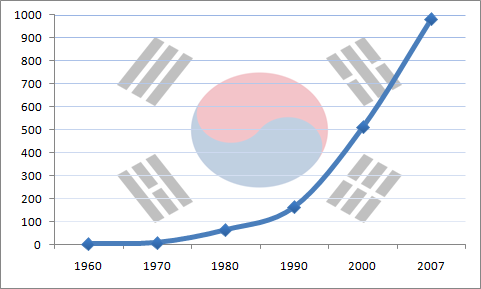I hope Tyler Cowen is wrong about this, but…
In Asia, the most likely future candidate for this problem [economic regression] is Taiwan, where real wages were largely stagnant from 2000 to 2011. In 2012, Taiwan’s trend was even more disturbing: Its economy grew 1.3 percent, but real wages fell 1.6 percent, both adjusted for inflation. Taiwanese capital has flowed into China, creating a new class of Taiwanese millionaires but hollowing out the country’s manufacturing base as capital was reallocated to the mainland.
There is an anti-democratic camp in Taiwan which blames the introduction of democracy itself for the country's problems – insinuating that Taiwan would be better off under a KMT autocracy or martial law. This appears to be a post hoc ergo propter hoc fallacy, as the experience of South Korea plainly shows:

(Graph of South Korea's nominal GDP from Wikimedia.org)
Two Asian countries (Taiwan and South Korea) both democratized at roughly the same time, and yet their economic paths after democratization were very different. To my mind, the chief difference between the two is that South Korea didn't leave its own industry to wither on the vine while flooding Communist China with investment capital.
Taiwan, unfortunately, did.
i-1